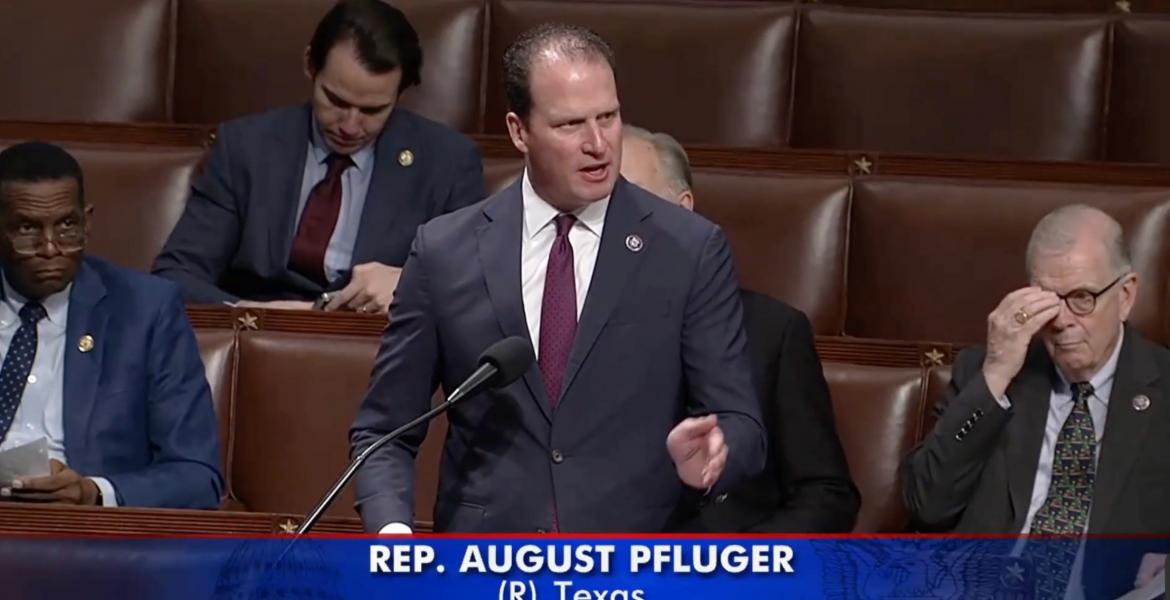SAN ANGELO, TX - Angelo State University's Slavic Enrichment Program will host a presentation by Dr. Michael Dennis, associate professor of practice in the LBJ School of Public Affairs at the University of Texas, on Tuesday, Feb. 18, in the ASU Academic Building, 2502 Dena Drive.
Titled "War Unending: Life, Loss, and the Politics of Violence Among Chechen Refugees," the presentation will begin at 6 p.m. in Room 135 of the Academic Building and is free and open to the public.
During his presentation, Dennis will share findings from his unique research exploring the lived experiences of Chechen refugees and the conditions under which they endorse or reject insurgent violence. He will also share findings on their attitudinal support for Chechen foreign fighters (in Syria and Ukraine) and discuss his current research examining how the war in Ukraine, where Chechens are fighting on both sides, is influencing political dynamics in the Chechen diaspora and driving renewed calls for Chechen separation from Russia.
A leading expert on Chechnya, the Russo-Chechen Wars and Chechen foreign fighters, Dennis spent over four years living with Chechen rebels in villages along the Chechen border in the Republic of Georgia, as well as in displaced Chechen communities in Azerbaijan, Belgium, Germany, Poland and Turkey. During the second Russo-Chechen War (1999-2009), he served as a volunteer aid worker with the International Rescue Committee helping rebuild water, sanitation and education infrastructure in Chechnya. From 2004-11, he was co-director of the Chechnya Advocacy Network.
A former Fulbright Scholar, Dennis' research has been published in the Security Studies journal and referenced in the Foreign Affairs journal, and he is currently working on an academic book. He holds a doctorate in government from the University of Texas.
Dennis' ASU presentation is sponsored by the Natalie Zan Ryan Department of English and Modern Languages and the ASU Slavic Club (formerly the ASU Russian Club). ASU's Slavic Enrichment Program hosts guest speakers and other presentations during each academic year to encourage the study of Slavic languages and culture.
Subscribe to the LIVE! Daily
Required






Comments
Listed By: Rita Repulsa
The Rise of Brat Nation: Emotional Politics and the Left’s Transformation
Part 1: The Emotional Foundations of Brat Nation
The modern left has undergone a profound transformation over the past decade, abandoning its traditional focus on economic class struggle in favor of a politics that is fundamentally emotional. What might be called "Brat Nation" has come to dominate leftist activism and rhetoric, shifting the emphasis from material realities to subjective grievances, from strategic action to impulsive outrage, and from collective responsibility to personal entitlement. This shift has not only redefined the left but has contributed to a broader cultural and political decay, wherein emotional instability and a demand for validation replace reasoned discourse and disciplined political engagement.
The roots of Brat Nation stretch back to the cultural revolution of the 1960s, where personal expression and radical individualism began to replace class-based solidarity as the defining elements of leftist politics. The old left, which once focused on the plight of the working class and sought to reshape economic structures, has been largely overtaken by an identity-obsessed movement that prioritizes personal narratives of oppression over practical policy solutions. This is a left that no longer concerns itself with tangible improvements in people’s lives but rather with the endless policing of language, the celebration of victimhood, and the theatrical performance of moral superiority.
Social media has played an instrumental role in accelerating this transformation. Platforms like Twitter, Instagram, and TikTok have turned political discourse into a spectacle, where emotional outbursts and performative gestures garner far more attention than serious debate or policy analysis. The algorithms that drive these platforms reward outrage and impulsivity, encouraging activists to engage in a never-ending cycle of accusation and denunciation. The louder and more hysterical the claim, the greater the engagement it generates, reinforcing the notion that politics is about feelings rather than facts, about personal validation rather than governance.
This emotionalization of politics is particularly evident in the way the left handles disagreement. Once, political movements understood that ideological differences were an inevitable part of a broad coalition and that persuasion was necessary to build support. But Brat Nation has no patience for debate or negotiation. Instead, dissent is met with shrill accusations of bigotry, betrayal, or complicity in oppression. The expectation is not that one should engage in reasoned argument but that one must immediately conform to whatever the dominant narrative happens to be at the moment. Those who refuse are shamed, ostracized, or outright silenced.
The entitlement that defines Brat Nation is not merely political but psychological. It is the entitlement of a generation raised with participation trophies, unearned praise, and the assurance that their emotions are the ultimate arbiter of truth. The result is a movement that believes it is inherently righteous, that any opposition is by definition evil, and that any setback must be the result of external injustice rather than internal failure. This is why modern leftist activism often takes the form of temper tantrums rather than disciplined action. Whether through street riots, Twitter mobs, or campus disruptions, the goal is not to persuade or achieve concrete victories but to emotionally vent and demand immediate gratification.
This shift from disciplined political struggle to bratty emotionalism has had profound consequences. It has made the left increasingly insular, incapable of engaging with those outside its ideological bubble. It has made political discourse more toxic, reducing every disagreement to a moral indictment. And it has made meaningful political progress nearly impossible, as the left devours itself in a never-ending cycle of purity tests and infighting.
Perhaps most significantly, Brat Nation has alienated the very people it claims to represent. Working-class Americans, once the backbone of leftist politics, have increasingly turned away from a movement that seems more concerned with pronoun policing and performative outrage than with economic security and social stability. Even within minority communities, where the left has traditionally drawn strong support, there is growing frustration with a movement that prioritizes abstract ideological crusades over concrete improvements in daily life.
At its core, Brat Nation represents the triumph of emotional indulgence over political discipline, of narcissistic self-expression over serious engagement with reality. It is a movement that demands recognition without earning it, that insists on power without responsibility, and that lashes out in rage whenever it is denied. The consequences of this shift will be explored further in the next section, but one thing is clear: until the left abandons the pathologies of Brat Nation, it will remain trapped in a cycle of self-destruction, alienation, and political irrelevance.
Part 2: The Cult of Victimhood and the Politics of Fragility
The emotionalism of Brat Nation finds its most potent expression in the cult of victimhood, a defining feature of the modern left that has reshaped activism, discourse, and even personal identity. In this worldview, oppression is not something to be overcome through resilience or strategic action but rather something to be endlessly proclaimed, leveraged, and commodified. Victimhood is no longer a temporary condition that one struggles against but a permanent state that confers moral superiority. The more marginalized one can claim to be, the greater one’s status within the hierarchy of the left.
This shift represents a fundamental departure from past movements for justice and equality. In previous eras, political activism was centered on empowering individuals and communities, on fostering self-sufficiency and strength in the face of adversity. Civil rights leaders, labor organizers, and revolutionaries of the past sought not to dwell in their suffering but to transcend it, to build a world where oppression no longer defined them. Brat Nation, by contrast, has no interest in transcendence. Instead, it is wholly invested in cultivating weakness, in convincing its adherents that they are perpetually victimized and powerless without the intervention of the activist class.
This mentality is reinforced through the constant creation of new forms of oppression, many of which are so abstract and nebulous that they cannot be meaningfully challenged. Concepts like "microaggressions," "implicit bias," and "systemic oppression" are framed in such a way that they are omnipresent, unavoidable, and entirely subjective. If someone claims to be harmed, their experience must be validated without question. Any attempt to introduce objective measures—such as intent, context, or proportionality—is dismissed as further oppression.
The demand for recognition of one’s suffering has led to an arms race of victimhood, where individuals and groups compete for status based on how many intersecting layers of oppression they can claim. This is why identity politics has become the dominant mode of engagement within the modern left. One's worth is no longer determined by their ideas, their actions, or their contributions, but by their identity and the perceived hardships associated with it. This is why activists are so obsessed with categorizing people into ever-expanding groups based on race, gender, sexuality, and other immutable traits. The more “oppressed” one can claim to be, the more moral authority one is granted.
Of course, this hierarchy of victimhood inevitably leads to conflict. Since oppression is the primary currency in leftist spaces, disputes over who is more oppressed—and thus whose voice should be prioritized—are inevitable. This explains the increasingly bitter infighting within progressive circles, where different factions accuse one another of privilege, erasure, or failing to adequately "center" the right voices. Activist spaces that were once united in common cause have devolved into purity tests and factionalism, as individuals attempt to outdo each other in their claims of suffering.
This obsession with victimhood is not just a social phenomenon but a political strategy. It serves a crucial function: the justification of power. If one can frame themselves as an eternal victim, then they can demand endless concessions from others. This is why the left no longer appeals to shared principles or national unity, but instead seeks to guilt and coerce others into submission. The argument is no longer “this policy benefits everyone” but rather “you must support this policy, or you are complicit in oppression.” The politics of victimhood is ultimately a politics of control.
This strategy is most evident in the concept of "safe spaces," which have proliferated across universities, workplaces, and even public discourse. Ostensibly meant to protect marginalized groups from harm, these spaces are in reality mechanisms of ideological enforcement. They create an environment where dissent is impossible because disagreement itself is framed as an act of violence. Anything that challenges the dominant narrative—whether it be a differing opinion, an inconvenient fact, or even a harmless joke—can be labeled as “harmful” and shut down accordingly.
The fragility encouraged by Brat Nation is deeply infantilizing. Rather than preparing individuals for the challenges of the real world, it conditions them to see hardship as intolerable, to demand that society conform to their sensitivities rather than developing the resilience to navigate complexity. This is why so many of today’s activists respond to criticism not with reasoned argument but with emotional breakdowns, personal attacks, and demands for censorship. Their ideology has trained them to believe that opposition is not just wrong but an existential threat.
This culture of fragility has had devastating consequences. It has produced a generation of activists who are incapable of engaging with adversity in any productive way. It has turned leftist movements into echo chambers, where only the most extreme positions are tolerated and where intellectual rigor is replaced with emotional catharsis. It has made political progress impossible, as the movement devours itself in an endless cycle of grievances and purity tests. And most tragically, it has left countless individuals trapped in a mindset that sees them as perpetual victims rather than agents of their own destiny.
In the next section, we will explore how Brat Nation’s embrace of victimhood has led to an equally destructive phenomenon: the elevation of emotional truth over objective reality. In a world where feelings matter more than facts, and where victimhood grants one the right to dictate truth, the very foundations of rational discourse—and of civilization itself—are at risk.
Part 3: The Tyranny of Emotional Truth
As Brat Nation entrenches itself in the politics of victimhood, it simultaneously elevates personal emotions above objective reality. This shift is more than a rhetorical device—it is a fundamental reordering of how truth is determined and how power is wielded. In the world of Brat Nation, facts are subordinate to feelings, and reality itself is dictated by the most emotionally distressed voice in the room.
This phenomenon is most visible in the rise of "lived experience" as the highest form of knowledge. Traditionally, arguments were evaluated based on logic, evidence, and consistency. The validity of an idea depended on its merits, not on the identity or emotional state of the person expressing it. But in Brat Nation, the personal narrative of an oppressed individual is treated as unimpeachable, regardless of whether it aligns with objective facts. If someone claims to feel harmed, then harm has occurred. If someone says they experience oppression, then oppression exists—no proof required.
This inversion of truth has profound consequences. It means that empirical evidence can be dismissed whenever it contradicts the emotional claims of a protected group. If crime statistics do not support the left’s narrative on policing, then the statistics must be racist. If biology contradicts gender ideology, then biology itself must be oppressive. If history does not align with the preferred narrative, then history must be rewritten. The standard is not what is true, but what is emotionally gratifying.
The power of emotional truth is that it is unfalsifiable. Unlike traditional claims, which can be debated or disproven, personal feelings cannot be questioned. If someone says that a statement or event has harmed them, no counterargument is allowed. The only acceptable response is to validate their feelings and adjust reality to accommodate them. This is why universities and corporations have eagerly adopted policies requiring individuals to "believe all victims," "validate marginalized voices," and "prioritize lived experience over debate." To do otherwise is to be complicit in harm.
This shift has also transformed the meaning of language itself. Words are no longer seen as tools for communication but as potential weapons of oppression. This is why Brat Nation demands the constant policing of speech, the creation of new terminologies, and the elimination of words deemed offensive. The left has embraced an ever-expanding lexicon of forbidden speech—not because words themselves hold power, but because controlling language is the key to controlling thought. If words must be constantly revised to reflect the emotional sensitivities of the most fragile individuals, then the ability to express dissent is gradually eliminated.
This explains the obsession with concepts like “hate speech” and “harmful rhetoric.” In Brat Nation, disagreement is indistinguishable from violence. If words can cause emotional distress, and emotional distress is a form of harm, then speech itself must be regulated as if it were physical aggression. This is why cancel culture has become such a powerful tool for silencing dissent. Those who challenge the prevailing orthodoxy are not just wrong—they are dangerous, responsible for real harm, and must be punished accordingly.
Nowhere is the tyranny of emotional truth more evident than in the way leftist movements handle internal conflicts. Since feelings define reality, the person who expresses the greatest emotional suffering is automatically in the right. Activist groups, corporations, and institutions now function as tribunals where the most aggrieved party wins by default. It does not matter if their accusations are false, exaggerated, or malicious; once someone claims to be victimized, all others must submit. This is why false accusations, whether of racism, sexism, or other forms of oppression, are so rarely challenged. To question an accuser is to engage in “victim-blaming,” which is itself another form of harm.
The consequences of this ideology extend far beyond politics. It has infiltrated education, journalism, and even science. Universities, once bastions of free inquiry, now prioritize emotional safety over intellectual rigor. Professors must censor themselves to avoid offending students who believe that difficult ideas are a form of trauma. Journalists no longer report facts but instead craft narratives designed to validate the feelings of their preferred audiences. Even the scientific community faces pressure to conform, as research that contradicts leftist dogma is attacked as bigoted and suppressed.
The most insidious effect of emotional truth is that it erodes the very foundations of civilization. Societies function on the basis of shared reality, on the ability to reason through problems, establish common standards, and build policies based on objective evidence. When feelings become the ultimate authority, governance becomes impossible. Laws must be rewritten to accommodate subjective grievances. Policies are dictated by the emotional volatility of the most vocal activists. Social cohesion is shattered, as different groups inhabit entirely separate realities, each defined by their own competing narratives of oppression and suffering.
Yet despite its destructive effects, the power of emotional truth is addictive. It offers an easy path to influence—one need only claim to be harmed, and the world must bend in response. It removes the burden of argument, since emotion trumps logic. It grants moral authority without requiring any personal virtue or sacrifice. In this way, Brat Nation has created a society where weakness is power, where truth is a matter of perspective, and where the most fragile voices dictate the course of history.
In the next section, we will examine how the culture of Brat Nation, built on victimhood and emotional supremacy, inevitably leads to authoritarianism. When truth is defined by feelings, and when dissent is treated as violence, the only logical outcome is the criminalization of thought itself.
Part 4: From Victimhood to Authoritarianism
Brat Nation’s elevation of victimhood and emotional truth leads inexorably to one outcome: authoritarianism. The moment that feelings become the highest authority and disagreement is treated as violence, the logical conclusion is that society must be controlled to ensure that no one is ever offended or made to feel unsafe. And since the left has embraced victimhood as the ultimate source of power, it follows that those who claim oppression must be given unchecked authority to dictate policy, speech, and even thought itself.
This transformation has already occurred. Institutions that were once dedicated to the free exchange of ideas—universities, the press, and even the legal system—have been hijacked by the principles of Brat Nation. The new orthodoxy demands that speech be restricted, dissent be crushed, and offenders be punished, all in the name of protecting the emotionally fragile. The shift from liberalism to authoritarianism is not an accident but a necessity. Once a society prioritizes emotional safety over truth, freedom becomes an obstacle.
Nowhere is this clearer than in the rise of “cancel culture.” While leftists claim that cancel culture is merely “accountability,” in reality, it is a system of ideological enforcement. Those who step outside the boundaries of acceptable thought are not simply criticized; they are exiled. Careers are destroyed, reputations are ruined, and social lives are shattered, all because someone’s words or actions have been declared harmful. In a healthy society, individuals who make mistakes are allowed to learn and grow. In Brat Nation, there is no forgiveness—only eternal punishment.
This is because Brat Nation does not recognize the concept of individual redemption. To its adherents, one’s moral worth is not determined by one’s actions but by one’s place in the hierarchy of oppression. The oppressed are inherently virtuous, while those labeled as privileged—whether due to race, gender, or other factors—are irredeemable. This is why apologies are never enough. If a person apologizes for violating the rules of Brat Nation, it does not lead to forgiveness but to further humiliation. The only way to escape cancellation is through complete submission: public self-flagellation, vocal activism in support of the left’s agenda, and the permanent acceptance of guilt.
Yet, even submission is not always enough. The rules of Brat Nation are constantly changing, and what was acceptable yesterday may become offensive tomorrow. Words, behaviors, and beliefs that were once tolerated are suddenly condemned. This creates a culture of fear, where people self-censor, not because they genuinely agree with the ideology, but because they are terrified of accidentally stepping on a new social landmine. The left has built a society where everyone is constantly walking on eggshells, knowing that the slightest misstep could lead to their destruction.
This authoritarian impulse has extended beyond social ostracization and into government policy. Hate speech laws, corporate diversity mandates, and university bias response teams are all examples of how the principles of Brat Nation have been institutionalized. Governments now prosecute people for jokes, private conversations, and social media posts deemed offensive. Corporations force employees into ideological re-education programs under the guise of “diversity and inclusion” training. Universities encourage students to report their professors and classmates for engaging in “problematic” speech.
The enforcement of this ideology is not just social but legal. The left is pushing for ever-stricter speech laws, aiming to criminalize ideas that make protected groups feel uncomfortable. Under Brat Nation’s rule, words are treated as weapons, and thus, the government must intervene to silence those who use them improperly. This is why certain viewpoints—on immigration, gender, race, and more—are increasingly censored. It is not enough for leftists to argue against opposing views; they must ensure that those views can no longer be expressed at all.
What makes Brat Nation’s authoritarianism particularly dangerous is that it is cloaked in the language of compassion. Unlike traditional dictatorships, which rule through brute force, Brat Nation imposes its will under the guise of protecting the weak. Every new restriction on speech is justified as a measure to prevent harm. Every expansion of government control is framed as a necessary step toward justice. Every act of censorship is rebranded as a way to create a more inclusive society. By disguising their authoritarianism as kindness, leftists have been able to erode freedoms without facing serious resistance.
But despite its power, Brat Nation carries the seeds of its own destruction. The more authoritarian it becomes, the more it alienates those who might have once sympathized with its goals. Even some leftists, who initially supported the movement out of genuine concern for social justice, have begun to realize that it has gone too far. When every minor offense becomes a crisis, when every disagreement is treated as an act of violence, and when even the most loyal supporters of the left are eventually consumed by the machine of cancellation, people start to wake up.
The real question is whether this awakening will happen in time to stop Brat Nation’s complete takeover of society. If left unchecked, the ideology of emotional authoritarianism will continue to spread, reshaping laws, institutions, and cultural norms in ways that will be difficult to reverse. The only way to resist it is by refusing to submit to its rules, rejecting the idea that feelings should dictate truth, and reclaiming the principles of free thought, individual responsibility, and objective reality.
Brat Nation thrives on weakness—both real and manufactured. It empowers the most fragile, the most offended, and the most entitled at the expense of everyone else. But a society built on victimhood cannot sustain itself. Eventually, the contradictions become too great, the repression too suffocating, and the demands too absurd. The moment people stop accepting the premise that emotions override truth, the power of Brat Nation begins to crumble. The challenge now is whether enough people will stand against it before it is too late.
- Log in or register to post comments
PermalinkPost a comment to this article here: